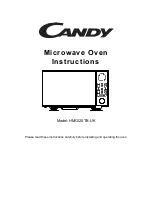
20
Special dishes
At low temperatures,
:
3D hot air is equally useful for
producing creamy yoghurt as it is for proving light yeast dough.
First, remove accessories, hook-in racks or telescopic shelves
from the cooking compartment.
Preparing yoghurt
1.
Bring 1 litre of milk (3.5 % fat) to the boil and cool down to
40 °C.
2.
Stir in 150 g of yoghurt (at refrigerator temperature).
3.
Pour into cups or small screw-top jars and cover with cling
film.
4.
Preheat the cooking compartment as indicated.
5.
Place the cups or jars on the cooking compartment floor and
incubate as indicated.
Proving dough
1.
Prepare the dough as usual, place it in a heat-resistant
ceramic dish and cover.
2.
Preheat the cooking compartment as indicated.
3.
Switch off the oven and place the dough in the cooking
compartment and leave it to prove.
Defrost
The defrosting time will depend on the type and quantity of the
food.
Observe the instructions on the packaging.
Take frozen food out of its packaging and place in a suitable
dish on the wire rack.
Place poultry on a plate with the breast side facing down.
Drying
With
:
3D hot air, you can dry foods brilliantly.
Use unblemished fruit and vegetables only and wash them
thoroughly.
Drain off the excess water, then dry them.
Line the universal pan and the wire rack with greaseproof or
parchment paper.
Turn very juicy fruit or vegetables several times.
Remove fruit and vegetables from the paper as soon as they
have dried.
Preserving
For preserving, the jars and rubber seals must be clean and
intact. If possible, use jars of the same size. The information in
the table is for round, one-litre jars.
Caution!
Do not use jars that are larger or taller than this. The lids could
crack.
Only use fruit and vegetables in good condition. Wash them
thoroughly.
The times given in the tables are a guide only. The time will
depend on the room temperature, number of jars, and the
quantity and temperature of the contents. Before you switch off
the appliance or change the cooking mode, check whether the
contents of the jars are bubbling as they should.
Preparation
1.
Fill the jars, but not to the top.
2.
Wipe the rims of the jars, as they must be clean.
3.
Place a damp rubber seal and a lid on each jar.
4.
Seal the jars with the clips.
Place no more than six jars in the cooking compartment.
Making settings
1.
Insert the universal pan at level 2. Arrange the jars on it so
that they do not touch each other.
2.
Pour ½ litre of hot water (approx. 80 °C) into the universal
pan.
3.
Close the oven door.
4.
Set
$
Bottom heating.
5.
Set the temperature to between 170 and 180 °C.
Dish
Ovenware
Type of
heating
Temperature
Cooking time
Yoghurt
Cups or screw-top
jars
on the cooking
compartment floor
:
50 °C Preheat
50 °C
5 mins
8 hrs
Proving dough
Heat-resistant dish on the cooking
compartment floor
:
50 °C Preheat
Switch off the appliance and
place the yeast dough in the
cooking compartment
5-10 mins
20-30 mins
Frozen food
Accessories Level
Type of
heating
Temperature
e.g. cream cakes, buttercream cakes, gateaux with chocolate or
sugar icing, fruit, chicken, sausage and meat, bread and bread
rolls, cakes and other baked items
Wire rack
1
@
The temperature selector
remains switched off
Fruit and herbs
Accessories
Level
Type of
heating
Temperature
Cooking time
600 g apple rings
Universal pan + rack
3+1
:
80 °C
5 hrs (approx.)
800 g pear slices
Universal pan + rack
3+1
:
80 °C
8 hrs (approx.)
1.5 kg damsons or plums
Universal pan + rack
3+1
:
80 °C
8-10 hrs
(approx.)
200 g herbs, washed
Universal pan + rack
3+1
:
80 °C
1½ hrs (approx.)
Summary of Contents for HB13AB.21B
Page 1: ......
Page 2: ......
Page 3: ......
Page 4: ......
Page 5: ......
Page 6: ......
Page 7: ......
Page 8: ......
Page 9: ......
Page 10: ......
Page 11: ......
Page 12: ......
Page 13: ......
Page 14: ......
Page 15: ......
Page 16: ......
Page 17: ......
Page 18: ......
Page 19: ......
Page 20: ......
Page 21: ......
Page 22: ......
Page 23: ......
Page 24: ......





































